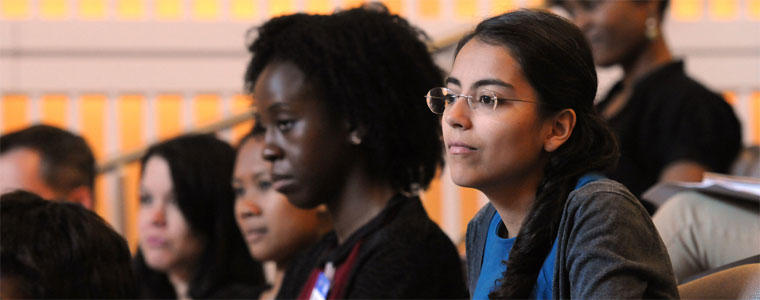Advancing Women’s Civil Society Organizations in Security Sector Reform
The U.S. Institute of Peace, in partnership with The Institute for Inclusive Security and the Geneva Centre for the Democratic Control of Armed Forces (DCAF), will host an expert panel to discuss the relationship between women in civil society and the security sector, to examine the obstacles women face, and how can they be overcome.
Read the event coverage, Taking the 'Thug' Out of Security Forces: What Women Can Do

Despite increasing recognition of the importance of women’s participation in security sector reform (SSR), women in civil society remain sidelined in dialogues about security, and women’s experiences continue to be overlooked. How can communities, especially women in civil society, be a part of making the security sector more effective and democratically accountable? Specifically, what role can women play in advancing a productive relationship between civil society and the security sector? What obstacles do they face and how can they be overcome?
The U.S. Institute of Peace's Center for Gender & Peacebuilding, in partnership with The Institute for Inclusive Security and the Geneva Centre for the Democratic Control of Armed Forces (DCAF), will host an expert panel to discuss the relationship between women in civil society and the security sector. This discussion will occur in conjunction with the recent publication, “A Women's Guide to Security Sector Reform,” co-authored by DCAF and The Institute for Inclusive Security. The panel will consider practical steps and tools that women in civil society can use to participate in dialogues on security, drawing on women's experiences in Afghanistan, Liberia, Libya, Serbia, Tunisia, and elsewhere.
9:30 am | Registration, Coffee & Tea
10:00 am | Welcome & Introductory Remarks
- Kathleen Kuehnast, Center for Gender & Peacebuilding, U.S. Institute of Peace
10:15 am | Panel
- Megan Bastick, Geneva Centre for the Democratic Control of Armed Forces (DCAF)
- Rangina Hamidi, Kandahar Treasure, Afghanistan
- Querine Hanlon, National Democratic Institute Senior Fellow, U.S. Institute of Peace
- Robert M. Perito, Security Sector Governance Center, U.S. Institute of Peace
- Tobie Whitman, The Institute for Inclusive Security
- Jacqueline O'Neill, The Institute for Inclusive Security (moderator)
12:00 noon | End



